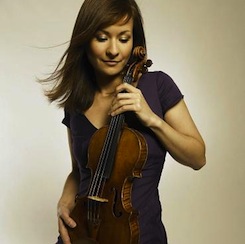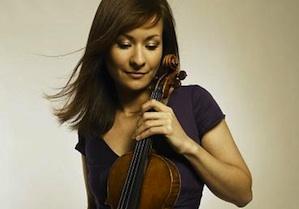
Violinist Arabella Steinbacher was born into a life of music. At 30 years old, she has already carved out an impressive career, bringing her winning smile and impeccable playing to many of the world’s great stages. After an unexpected debut in 2004 when she took the stage in Paris in place of a colleague, Steinbacher has scarcely had a moment to reflect on her near-instant fame. Her website is filled with the sound of her magical violin and brimming with pictures of her adventures, both on and off the stage. What strikes me most about her is her radiating charm. Her voice does a series of flips and twirls in a never-ending dance as she speaks. Even on a phone call crossing the Atlantic to her home in Germany, I could hear the smile on her lips throughout our entire conversation.
I find it absolutely fascinating that you are the daughter of two professional singers. Did they ever encourage you to study voice, or did the whole family know from the beginning that the violin was your calling?
They never expected me to become a musician, first of all. It was just more that they thought it would be a nice idea for me to have something to do during the day. They thought a little violin would be perfect, because I was only 3 years old. They heard about the Suzuki method. My mother — she’s Japanese, so she thought that would be a nice idea, to give me a little violin. So that’s how I started to play.
I listened all the time to the singers who came to our home to study with my father. My father was actually a pianist, and he was working at the Opera House in Munich for many years. He was also singing. My mother was also a singer, and that’s why she came from Japan to Germany. So that’s how everything started.
I imagine now when you go home you have fascinating dinner conversations. Is the focus always on music?
Actually, music was always in our life but we didn’t really talk all the time about music. But it was always around. For me, it was the most natural thing to make music. I was not even thinking about if I wanted to become a professional violinist or not. It was more like a natural development.
For me, it was the most natural thing to make music.
You began your studies at the Munich Academy of Music at age 9. Can you tell me what that experience was like? What your adolescent years were like?
It was, of course, quite an unusual situation because everyone was much older than me. But I wasn’t really going every day. It was more like going to the lessons regularly. So I didn’t really meet all the students yet; that came later. My father was also working there so it wasn’t completely new for me. It was a place I knew already.
You have done so much in your career already, and it must feel like a whirlwind every day. How do you manage to stay relaxed and focused so you can take on your next project or city?
I must say I feel much more relaxed than in the first year when I just started to play all the big concerts. Because in the beginning there, of course, is a lot of pressure when you have just had your debut and everyone is watching you and listening very carefully to what you are doing. So it’s quite exciting in the very beginning. And now I have the feeling when I come back to the orchestras — I look forward, so much, to see the people again. I can enjoy much more making music now than 10 years ago, which is really nice. But what I always do before every performance is to do a lot of yoga and meditation, because it helps me to become calm and focus on the concert.
You are returning to San Francisco Symphony after having your debut in 2011. Are there things you’re looking forward to more now? How are you preparing for this concert and your return to San Francisco?
Last time, I played Mozart with [San Francisco Symphony Conductor Laureate Herbert] Blomstedt. Mozart, of course, is very different from the piece I’m playing now. I’m playing the Tchaikovsky Concerto, so the orchestra will be much bigger. It will be much more the feeling of playing with a big symphony orchestra. Mozart is much more the feeling of making chamber music, which was really wonderful, especially with Blomstedt. We have played many times together before, also with Mozart.
I can enjoy much more making music now than 10 years ago, which is really nice.
This time it will be with [Charles] Dutoit, who I know also very well since quite a few years. It will be, of course, very different because the piece is completely different and it’s another conductor. I’m very excited. It will be a completely different color in the orchestra because of the piece. I’m looking forward very much.
I remember the last time I was in San Francisco, I had to go right after to Mumbai, to India, to play Tchaikovsky with Zubin Mehta. To travel from San Francisco to Mumbai — and I had to play the next day! It was quite stressful but quite a big challenge, as well. So this time will be more relaxed.
You’ve had so many exciting debuts, even in the last season. What is your next big debut or goal?
Next week, I’m going to play for the first time with the Cleveland Orchestra, and I look forward very much since I’ve heard so many great things about them. I have a few new recording projects. Of course, there are still some more orchestras I look forward to playing together with, but basically I am actually very happy with how it’s going at the moment. I really enjoy every performance, obviously to travel around and to see beautiful places like San Francisco. That’s really wonderful.

